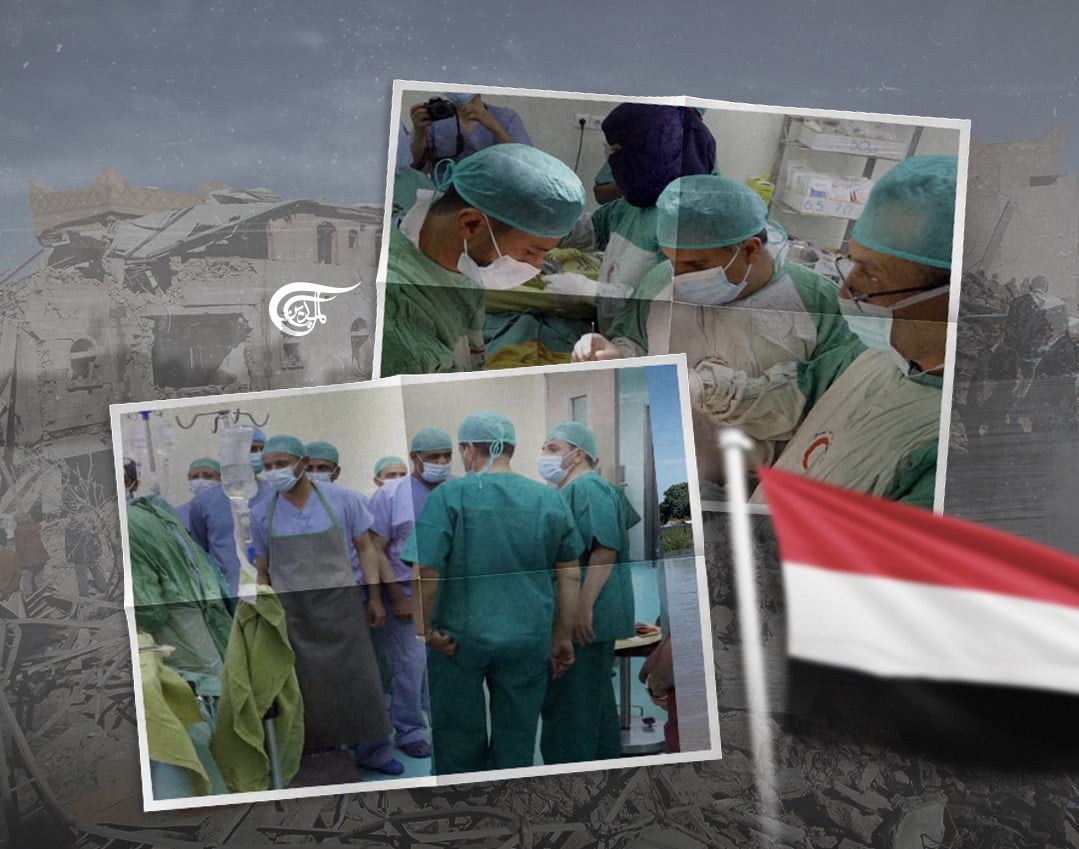Yemen's largest hospital resumes kidney transplant operations after years of suspension
Al-Thawra hospital in the capital Sanaa has resumed performing kidney transplants by a Yemeni team for free as the Health Ministry and Zakat Authority fund the operations.
Abdul-Fattah was lying in one of the kidney center's beds at Al-Thawra hospital on November 1 with a bodyguard beside him after he underwent surgery to have one of his kidneys removed to donate it to his brother who has been suffering from kidney failure for nearly two years.
"I donated my kidney to rescue my brother," said the 22-year-old Abdul-Fattah to Al Mayadeen English. "And now, I'm feeling good".
"It's a brotherly and humanitarian stance," Abdul-Fattah added. The donated kidney will be transplanted to his brother on November 2, he said.
Brother of Abdul-Fattah is one of 15,000 dialysis patients who "need a kidney transplant," said Najeeb Abu Osba, a kidney transplant surgeon.
"There are over 100k patients in Yemen suffering from kidney failure including 15k patients in need of kidney transplants", Abu Osba told Al Mayadeen English.
"Kidney failure patients in Yemen are increasing each day due to the ongoing [Saudi imposed] blockade and lack of medicine and dialysis centers," said Abu Osba.
Free kidney transplant
The kidney center of Al-Thawra hospital resumed kidney transplants in 2019 after the US-Saudi war of aggression on Yemen forced the center to stop the transplants in 2015 before shortly being suspended late in 2019 due to COVID-19, according to Abu Osba.
On October 29, the Yemeni Minister of Health Taha Al-Mutawakel announced the resumption of the first kidney surgery and transplant operation and considered the resumption a "positive step", especially in light of what he described as the efficient Yemeni staff headed by Ibrahim Hussein Al-Nono and Najeeb Abu Osba.
Al-Mutawakel said the first operation "was successful, and the patient's health is stable," without providing the name of the patient. He reiterated that the Ministry will work in cooperation with the General Authority for Zakat to bear the costs of kidney transplant operations so they could be made available for free.
"The surgery here is free; we paid [only] for examinations [before the operations]," Abdul-Fattah told Al Mayadeen English.
"We attempted to transplant [kidney for my brother] in Egypt, but we couldn’t afford the fees," he explained.
"The [resumption of] kidney transplant has alleviated our suffering in terms of travel costs and other burdens," said Abdul-Fattah. "If we performed it [the surgery] in Egypt, it would have cost us more than US$20K."
Yemeni team performs transplants
Najeeb Abu Osba, one of two transplant surgeons performing kidney surgeries and transplants at Al-Thawra hospital, said the dialysis center is the "first center of its kind in Yemen to transplant kidneys."
"More than 280 kidney transplants have been made in this center," Abu Osba told Al Mayadeen English. "We perform kidney transplants with 100% Yemeni staff including the assistance, nursing, urologist, and anesthetist staff; there's a complete Yemeni team."
Due to war and blockade, said Abu Osba, the program was suspended in 2015 but resumed in 2019 where they performed 12 kidney transplant operations.
He said kidney transplants resumed on Saturday, October 29. "We performed a kidney transplant on a patient - from Amran province - suffering from kidney failure and on dialysis for two years," said Abu Osba. "The operation was successful."
"We will perform a second transplant on November 2 for a patient from Dhamar province," he added, referring to the operation that will be performed on Abdul-Fattah's brother. He pointed out that during this week, two kidney transplant surgeries would be performed.
Role of Iranian Embassy
Motahar Morshed, head of Al-Thawra hospital, said the dialysis center at the hospital has a "high number of dialysis patients."
"We have been trying to cater to more patients, but we don't have the capacity to absorb the high number of dialysis patients," Morshed told Al Mayadeen English at his office, pointing out that this is what pushed them to inform the Iranian Embassy to support the center.
In May 2021, the Iranian Ambassador to Yemen, Hasan Irlu - who died in December 2021 after being infected with Covid19 - visited the dialysis center after the Ministry of Health signed a memorandum of understanding with the Iranian Embassy in Sanaa for funding the rehabilitation of the dialysis center.
"The Embassy funded the project of rehabilitating the center and expanding chairs from 40 to 80," said Morshed, stressing that the Iranian Embassy funded the center in general, including transplant and operating rooms and equipment for dialysis.
He added that the Embassy also expanded the "Intensive Care Unit to include 8 additional chairs" and "repaired the dialysis machines and provided new nephroscopes and other requirements for the center."
The expansion and rehabilitation of the center were launched in September 2022.
"Thankfully we have resumed kidney transplant after three years of suspension," said Morshed. "All thanks to the [late] ambassador and the entire team of the Iranian Embassy."
Abdul-Rahim Al-Hazmi, a kidney patient who was put since February 2020 on dialysis, said, "I'm delighted to see the rehabilitation and expansion of the kidney center that found a solution to the shortage of chairs for hemodialysis sessions in the old building where services were bad and the building itself was crumbling," Al-Hazmi told Al Mayadeen English.
"Now, I do dialysis in a comfortable chair with good light in the room," he said.

 Naseh Shaker
Naseh Shaker
 5 Min Read
5 Min Read












